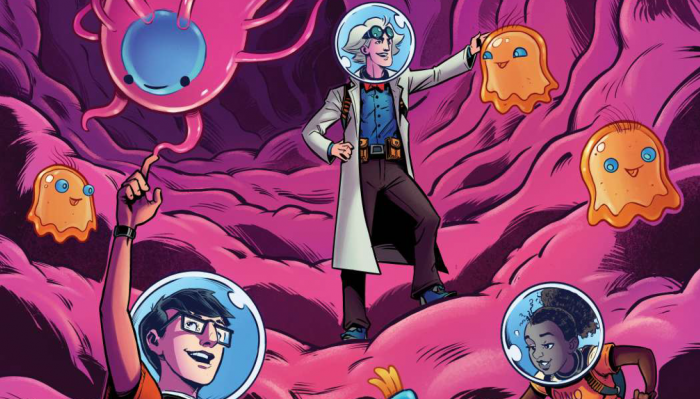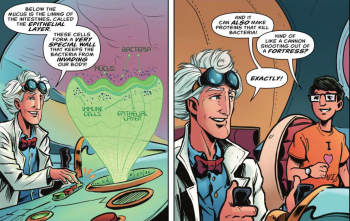
Doctors often deal with medical conditions that might be somewhat embarrassing or just difficult for patients to understand. Inflammatory bowel disease, a serious and debilitating condition that, as the name implies, affects the intestines and everything that comes out of them, is one of those ailments.
Medical providers who treat and investigate IBD have to find ways to explain their patients’ situation during medical appointments that may last less than 30 minutes—all while the patient and their caregivers might be overcome with emotion or concern. Too often what the doctors tell them is lost or only partially retained.
Dr. David Suskind, a pediatric gastroenterologist at Seattle Children’s Inflammatory Bowel Disease Center, realized that the caregivers of the children he treats can read pamphlets or educational books about the disease, but he didn’t have anything specific for the kids that explained their condition.
Suskind also understood that having better-informed patients and families would lead to better treatment results.
“One of the things that we do know in medicine is that when patients are educated, when they know what they’re doing and why they’re doing it, there is a much higher compliance, much better quality of life and expectations,” Suskind said. “Education equals better outcomes— a hundred percent.”
This realization led Suskind to create the “Professor Nimbal Comic” for children and their caregivers. The comic explains the concepts of the disease in a fun and simple way, so the patients would understand what IBD is and what it does to a person’s gut. It would also tell the children that they could be treated, and that the vast majority would get better.
The comic starts with a child who is trying to explain to a friend that he just found out from the doctor that he has IBD, but he doesn’t really know what that is—but he does note that the doctor “kept talking about poop” and how gross it was.
The friend suggests they visit Professor Nimbal, an acronym for the Nutrition in Immune Balance organization, which helps patients integrate dietary therapy into IBD treatment. Suskind’s research revolves around the effect of diet on IBD, which 15 years ago was not a focus of other investigators.
Professor Nimbal, who has an uncanny resemblance to Dr. Emmett Brown from the “Back to the Future” movies, guides the two children through a human body’s intestinal organs in his “P.O.O.P.”—or People Operated Omniverse Projectile—to explain how IBD develops and how it is treated.

The comic uses simple language to explain bodily functions and how they interact to cause the inflammation and pain that IBD patients experience, as well as the importance of diet.
“This aspect of the story allows people to see the impact of why diet plays a role in IBD,” Suskind said. “And, from the patient’s perspective, as well as the parent’s perspective, it allows them to say, ‘Oh, you know, maybe I shouldn’t be eating that giant Twinkie.’”
Translating the Comic for Diverse Audiences
Suskind said the comic was first translated into Spanish locally because of the large percentage of Latino children who are treated at the hospital. He then teamed up with gastroenterologists from around the world to help translate into eight other languages, which would help to provide care for patients from diverse backgrounds.
The comic so far has been translated into Portuguese, Hebrew, Urdu, Hungarian, Romanian, Dutch, French and Arabic.
Suskind said he has received a good response from both the children and their parents.
“It was really made with the kids in mind and trying to help with the educational process, but the parents seem to really enjoy it. They actually come back with not only really nice positive feedback but also with more questions,” Suskind said.
Suskind said he worked with illustrator Jason Piperberg to create the story, which took about a year. He sent the comic to all 2,200 gastroenterologists in the U.S. and the response was also very positive.
Dealing With the Stigma
The subject matter of the comic — the intestinal issues, the “gross” nature of it all — could be a sensitive, or even embarrassing, topic, but Suskind takes it all in stride. After all, IBD is a very serious matter that is increasing dramatically around the world, he said.
“Helping those patients who look at bowel disease, bowel issues as having a negative connotation or a stigma—we try to help those patients realize that it’s not, and we try to help them realize that it’s a part of being human,” he added. “We all have intestines; we all have bowels. Unfortunately, some people develop bowel conditions and its nothing to be ashamed or scared about.”
Suskind added that Seattle Children’s has a very large patient population, and every patient is unique “in their own wonderful way.”
“The one thing about being human is that we all come from our different perspectives, and that’s good,” Suskind said. “But if that perspective gets in the way of somebody’s health or how somebody is doing, then we need to help change it. That’s the purpose of the comic.”
Resources:
Seattle Children’s Inflammatory Bowel Disease Center
NiMBAL Nutrition in Immune Balance

